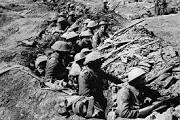5 August 1914: England declares war on Germany A late-night meeting,

The Guardian, 5 August 1914: England declares war on Germany A late-night meeting, then a war declaration: a look back at how we reported the beginning of the first world war See the original page from the Manchester Guardian Guardian 1914: England declares war on Germany Photograph:
Guardian Tags: First world war , UK news, The Guardian, Germany Will Woodward Tuesday 5 August 2014 01.43 BST
The Manchester Guardian recorded 100 years ago on Tuesday that “Great Britain declared war on Germany at 11 o’clock last night,” and that an ultimatum from the cabinet to the German government had received an “unsatisfactory” reply and therefore “the King held at once a council which had been called for midnight”.
The paper is, of course, dominated by the war, which features substantially on seven of the 10 pages. That said, the first two pages featured only small ads and notices – news did not appear on the front page until 1952.
The page pictured is page 5. Among the pieces: a table of the estimated strength of the British and German fleets in the North Sea; two reports from Reuters in Berlin including “The Kaiser’s

Appeal to Germany”; photographs of Sir JR Jellicoe and Sir John French, “the command of the British forces on land and water”late news of a “German advance near Liege”; a story speculating “that at least 30,000 Manchester and Salford men will receive the call to arms”; and public correspondence between Sir Edward Grey, the foreign secretary and Sir George Buchanan, Britain’s ambassador to Russia, in St Petersburg (effectively reprinting an exchange between the German government and Tsar Nicholas II).
“We are authorised to publish thefollowing documents …” the paper explained.
The Guardian’s editor, CP Scott, who had urged Britain to stay neutral in the conflict, went to London on the day war was declared to see the prime minister, Lloyd George.
The leading article accepted that “Some time the responsibility for one of the greatest errors in our history will have to be fixed, but that time is not now.
Now there is nothing for Englishmen to do but to stand together and help by every means in their power to the attainment of our common object an early and decisive victory over Germany.” (“England” and “Britain” are used interchangeably.)
Elsewhere in the paper are signs that much of the world had yet to comprehend the scale of the coming catastrophe. It includes notes from “The Sunny South”, such as Bexhill
“Notwithstanding the tension caused by the international situation, there are a large number of visitors here for the commencement of the high season”; and also three columns of cricket reports and scores, including an “intensely keen” match between Lancashire and Yorkshire at Old Trafford, including seven wickets for England allrounder Wilfred Rhodes.
More on this story Enemies in life, comrades in death: a century to count the cost of war 4 Aug 2014 Unknown fallen of the first world war honoured in schoolgirl’s remembrance 4 Aug 2014
Europe’s leaders hail ties of peace as they mark first world war centenary 4 Aug 2014 Peace campaigners protest at official commemorations of first world war 4 Aug 2014 David Cameron attends first world war commemoration service at Glasgow cathedral – video
By Gwynne Dyer























